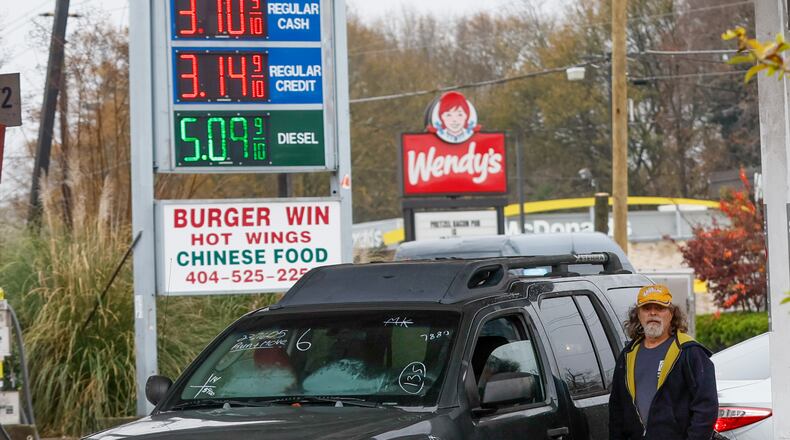A six-month decline has brought the price of metro Atlanta gasoline to its lowest level in more than a year, helping to cushion consumer finances through the holiday season.
The average price of regular gas in the region mid-day Friday was $2.94, down $1.60 — a 35% drop — since peaking in June, thanks to a ramp-up in global fuel production and a weaker worldwide demand.
And as global oil prices tumbled, so did pump prices, said Montrae Waiters spokeswoman for AAA Auto Club Group. “Declining crude oil prices continue to be the single largest factor influencing gas prices.”
Georgia drivers have also benefitted since March from the suspension of the state’s 29.1 cent-a-gallon gas tax, but that tax will return in January, Gov. Brian Kemp said this week.
When that tax returns, prices will rise, but not necessarily by the full amount of the tax, said Patrick DeHaan, senior petroleum analyst for Gas Buddy, which tracks fuel prices nationally.
“Stations have some room to absorb some of the tax as wholesale prices have been falling, giving them somewhat of a small cushion,” he said.
The biggest increases will probably come at the lower-priced stations, he said.
On Friday, a number of metro Atlanta stations were charging less than $2.60 a gallon for regular, the lowest a Shell in Lawrenceville with a cash price of $2.53, according to Gas Buddy.
The highest priced gasoline was a Shell in Acworth charging $3.96 a gallon.
Gas prices have been the most visible example of inflation, the broad rise in prices that has triggered a rate-hike campaign by the Federal Reserve in the hopes of dampening prices.
By making it most expansive to borrow money, the Fed is slowing the economy, probably enough to cause a downturn, said Stuart Hoffman, senior economic advisor at PNC Financial Services.
“The result of this and other geopolitical factors will be a mild U.S. recession starting in the spring of 2023,” Hoffman said.
Still, lower gas prices will make it easier for consumers to spend on goods and services through the holidays, he said.
And that in turn is an economic boost, since consumers account for about 70% of the economy and gas prices are key to how consumers feel, said Jared Bernstein, a member of the White House Council of Economic Advisers.
“One of the biggest weights in the Consumer Price Index is housing, but few people experience home prices or rents month to month,” he said. “Gas prices loom very large in our thinking.”
Falling gas prices are a counterweight to the Fed’s tightening, Bernstein said. “Consumers have a bit more breathing room. There are headwinds but there are also some big tail winds.”
Gas prices, which were hovering over $2.40 a gallon when the pandemic hit, plummeted to $1.60 as tens of millions of vehicles parked in garages and driveways for months. With demand plunging, global production also fell.
As residents gradually returned to the roads, prices steadily rose. But it was Russia’s invasion of Ukraine last February that shook supply chains, sent speculation into overdrive and juiced oil prices to record heights.
The Biden administration for a time siphoned millions of barrels from the nation’s reserve hoping to blunt the increase. Experts say the impact was modest and the broader decline in prices came because production was climbing while anti-COVID measures in China had dampened energy demand there.
However, prospects for further price declines are uncertain.
Chinese authorities seem poised to open the economy more, which would spur demand. Meanwhile Saudi Arabia and Russia have spearheaded efforts to ratchet back production.
Metro Atlanta average gas price*
Friday: $2.94
Month ago: $3.14
Peak: $4.54 (June 15)
Year ago: $3.18
Average Friday gas price*
Metro Atlanta: $2.94
Baton Rouge: $2.82
Charlotte: $3.08
Chicago: $3.60
Honolulu: $5.10
Los Angeles: $4.65
Orlando: $3.10
Seattle: $4.29
U.S.: $3.26
*For a gallon of regular gasoline
Source: Gas Buddy
About the Author
Keep Reading
The Latest
Featured




